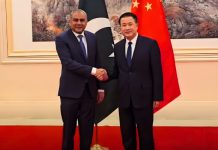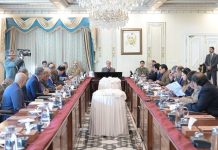-Says can be partners with US in peace but never in conflict
-Invites opposition for talks on electoral reforms
-Terms EVMs only way to end election controversies
-Highlights “tough decisions” taken due to huge loans
-Emphasizes that Pakistan’s COVID situation better than neighbouring States
-Claims 12 million families to benefit from Ehsaas programme
-Predicts Tax target to be achieved through FBR reforms
By Uzma Zafar
ISLAMABAD: Prime Minister Imran Khan on Wednesday delivered a long address to the National Assembly during which he said Pakistan will not compromise in its sovereignty while stressed that Pakistan could partner with the United States in peace, but never again in war.
Following this comment, even JUI-F lawmakers thumped their desks. “The US was defeated in Afghanistan and they tried to shift the blame of their defeat on us,” said PM Imran Khan. The prime minister said the Afghanis were the brothers of Pakistanis, and that Islamabad knew them better than Washington. “We have decided to not comprise on the country’s sovereignty.”
PM Imran Khan said the US was trying to force Pakistan to bring the Afghan Taliban to the negotiating table, but we “do not wish for strategic depth in Afghanistan and we will respect the decision of the Afghanis.”
The premier said Pakistan chose to aid America in the war against terror “but after that, we captured our own people and sent them to Guantanamo Bay, and former president Pervez Musharraf admitted this”.
“We sacrificed 70,000 people and wasted $150 billion in the war against terror,” he said, adding that after the Tora Bora incident, Al Qaeda started its operations in Pakistan.
“We received directions to send our troops to the tribal areas in pursuit of a few hundred people,” the prime minister said. He noted that the people living in tribal areas paid a hefty price as they were collateral damage in drone attacks.
PM Imran Khan said at the time of the war on terror, Pakistanis were unable to differentiate between their friends and enemies. “Does a country launch an attack on its ally?” he asked. The premier said that the government at that time, during the war on terror, “did not have the courage to say no to the US and kept on lying to the people”.
“We must understand that when a nation does not respect itself, it is not respected by the world we only want peace to prevail in Afghanistan, and that is in our best interest.”His address came a day after the government smoothly passed Finance Bill 2021-22.
A large number of Opposition leaders were not in attendance during the speech. From the PML-N this included party president and Leader of the Opposition in the National Assembly Shehbaz Sharif, former prime minister Shahid Khaqan Abbasi, former foreign minister Khawaja Asif, and party general secretary Ahsan Iqbal. Among PPP leaders Chairman Bilawal Bhutto Zardari, former President Asif Ali Zardari were absent, whereas from the JUI Maulana Asad Mahmood was not in attendance.
However, Opposition leaders Rana Sanaullah, Khawaja Saad Rafique, Raja Pervez Ashraf and Abdul Qadir Patel were present in the House. In addition, 96 members of the Opposition were present in the House during the prime minister’s speech.
Invitation to Opposition for electoral reforms: He also lay particular stress on making elections controversy-free and inviting the Opposition to work with the government on reforms that will help achieve that aim. “After 1970, all elections have been controversial,” said the prime minister at the start of his address, adding that the recently held by-polls and Senate elections were made controversial as well. PM Imran Khan said the government had been mulling ways to make the elections acceptable to all the parties, and reminded the Opposition that election reforms would benefit democracy.
“The time has come to make the country’s elections acceptable to everyone,” he said, adding that in the US, when former president Trump had cast aspersions on the elections, their media and people demanded proof. “We did the same in 2013. We had asked the then government to hold recounting in four constituencies, and in all four, rigging was proved.
“After trying our best […] we came to the conclusion that EVMs (electronic voting machines) are the only solution,” he said.
Lauding Minister for Finance Shaukat Tarin and his team, the premier said they had presented the budget in line with his vision. “When we had begun our struggle 22 years back, we had one aim in mind: to build an Islamic welfare state — the objective of our founding fathers.”
The premier said if the country steps back from this aim, then there would be “no justification for Pakistan’s existence”. PM Imran Khan said that the budget reflected the PTI’s three core principles, justice, humanity, and self-sufficiency, and lauded his financial team for ensuring the budget embodies all three.
‘Painful, tough decisions’: The premier said the government’s survival in its initial days was tough, as they had a huge current account deficit to deal with. “The initial days of our government were very troubling it was very painful when we had to take tough decisions that had and continue to have consequences for the people.” Giving the example of Turkey, he said when Recep Tayyip Erdogan had come into power, even his government took loans from the International Monetary Fund and had to face a tough time for three years.
PM Imran Khan thanked Pakistan’s allies, UAE, Saudi Arabia, and China, that had saved Pakistan from defaulting by providing loans. Had we defaulted, he said, the investors would have pulled out their money from the country’s capital market. “We tried not to approach IMF, but eventually, we had to. Following that, the coronavirus emerged and battered an already struggling economy.”
Coronavirus response: On the occasion, the premier lauded National Command and Operations chief Asad Umar, Special Assistant to Prime Minister on Health Dr Faisal Sultan, the Pakistan Army, and others involved in curbing the spread of coronavirus. PM Imran Khan said Pakistan’s coronavirus situation was better as compared to countries in the region, and it was “due to Allah’s blessings and the poor people’s prayers”.
The premier said inflation and unemployment spiked in countries where lockdowns were imposed, however, “we did not shut down everything and thus saved the people from such ordeals”.
Agricultural yield boosted economy: Speaking about the challenges faced by the agricultural sector, the prime minister said locusts were attacking agricultural fields and the government’s machinery worked even on Eid days to get rid of them. “We protected the crops, and as a result, there was record growth of wheat, rice, and corn,” the prime minister said, adding that the sugar mills made timely payments to the farmers, which helped them invest back into their fields.
“Unfortunately, we have not paid attention to the agricultural sector in the last few years,” he said. “We also gave incentives to the export industry, and it grew by 17%,” he added. The premier said the government tried to help the farmers get fully compensated. “When the farmers had money to invest, the wheels of economic growth began to turn and we saw a rise in growth rate.”
The premier said Pakistan’s exports hit a record $2.7 billion in June, and the country’s GDP reached 4% as the government took important steps to revive the economy after coronavirus battered it. The prime minister said that Rs60 billion had been allocated in the federal budget for uplifting the agriculture sector. Tax exemptions worth Rs100 billion rupees would also be given to enhance the productivity of the sector and ensure food security.
Furthermore, the premier said that the Punjab government had launched a “Kissan Card Scheme” through which the farmers in the province would get incentives. He said small farmers would be given direct subsidies on inputs such as fertilizers and pesticides, adding that “kissan markets” will also be established so that the farmers get fair prices for their crops.
SMEs, Ehsaas programme, health care: The prime minister said the Small and Medium Enterprises sector is being incentivised to generate economic activity and provide job opportunities to the youth. Five hundred billion rupees have been earmarked to uplift four to five million people belonging to the weakest segments of society, he said.
Elaborating on how the government intends to uplift the sector, he said the government would provide people interest-free loans, health cards, and technical training, and they will be made part of the low-cost housing programme. The health cards scheme would bring a revolution in the health sector of the country and the private sector will be fully facilitated, he said, adding that the government would also allow duty-free import of medical equipment.
Speaking on the Ehsaas programme, the prime minister said 12 million deserving households would be given direct subsidy on the purchase of essential commodities from the utility and general stores. The prime minister appealed to the people to honestly pay their taxes, as this would help the country move towards economic stability.
Tax target: A whopping Rs5,800 billion tax collection target has been set for the next fiscal year, the prime minister said, adding that this was an ambitious target, but through FBR reforms, the government could achieve it.
“Willful tax defaulters will be put into jail,” PM Imran Khan said. Investment from overseas Pakistanis: Commending the overseas Pakistanis for the record remittances sent, the prime minister asked them to make investments in different sectors of the economy as well, assuring them the obstacles in their way would be removed.
Relations with India: PM Imran Khan, paying tribute to the people of Indian-occupied Jammu and Kashmir, said Pakistan stands by them and reiterated that diplomatic relations would not be restored with New Delhi until it rescinds the illegal steps taken on August 5, 2019.




